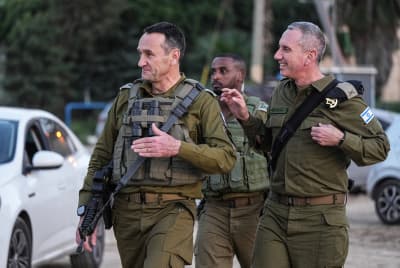Israel-Gaza War, IDF, Analysis
How improbable IDF Spokesperson Daniel Hagari captured the heart of the Israeli Nation
The voice we never knew we needed, IDF Spokesperson Rear Admiral Daniel Hagari is a voice of calm and reason during wartime.

Each evening as the sun sets over Israeli skies, Israelis turn on their televisions for the now must-see broadcast - the nightly press briefing by IDF Spokesman Rear Admiral Daniel Hagari. Standing squarely before two Israeli flags, Hagari recounts in plain language the day's military operations against Hamas and Hezbollah militants. He bows his head solemnly to honor fallen soldiers before fielding questions from reporters.
In the chaotic months since Hamas's massacre of civilians sparked the latest Israeli-Palestinian war, Hagari's frank yet compassionate updates have made him an unlikely celebrity and united a nation gripped by conflict. From left to right on the political spectrum, secular to religious, Israelis of all stripes have fallen for the 47-year-old career naval officer's direct style.
"Everyone loves Daniel Hagari," proclaimed a popular comedian in a viral video, as reported by Kann News. Israeli singer Aya Korem even rewrote the lyrics to her hit song to proclaim he caused a "humanitarian crisis in my heart."
Hagari's meteoric rise is a stark departure from the fawning roles of past military spokesmen. He eschews patriotic bluster, admitting setbacks on the battlefield. More often, he simply validates the shared sacrifice and trauma Israelis are enduring.
As reported by The Jewish Insider, Nachman Shai, arguably the most iconic IDF spokesman during the Gulf War says, "Hagari looks like someone you can trust. ... The public sees his spirit and they like it."
The stern but empathetic face of Israel's military was an unlikely path for Hagari, who grew up in Tel Aviv surrounded by the arts. The eldest of three brothers, he majored in theater and biology, starring in school plays. His mother ran the subscription office at the prestigious Cameri Theater where Hagari spent hours backstage.
He joined the IDF in 1995, scaling the elite ranks of Shayetet 13, Israel's version of the Navy SEALs. This combat experience lends him a gravitas recent spokesmen lacked.
Where no IDF spokesman in over 20 years has done live English broadcasts for the world's press, Hagari does just that. He has also embedded prominent foreign correspondents with Israeli troops to showcase evidence of Hamas's brutality, such as underground tunnels and a hospital used as a militant base.
In a society disillusioned by political leadership, Hagari represents something different - a credible voice untainted by partisanship. Yet in rallying public morale and fortifying international support for Israel's mission, the straight-shooting spokesman seems to be having the intended effect. With no end to the bloodshed in sight, Hagari's unwavering presence has emerged as a reassuring constant for a nation under fire.